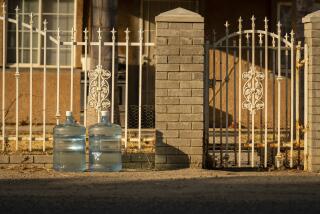Opinion: Is water on the way to becoming ‘clear gold’ in California?
- Share via
Water may soon become more valuable than oil.
That’s the punch line of today’s cartoon, which responds to the Los Angeles Department of Water and Power’s proposal to raise revenue, to fix its crumbling infrastructure and encourage conservation during the ongoing California drought. It is seeking rate hikes from its residential customers, as high as 34% over the next five years for the heaviest water users.
The idea of water as a scarce and costly resource is not a new one. After all, water wars have long been part of the reality and the lore of the West. But in modern times, we instead tend to think of water as something that literally falls out of the sky for free. That’s in no small part because the political class and the media seem uninterested in tackling the topic.
For the most part, speculation about water as “clear gold” has been limited to science fiction. One of my favorite examples is the 2008 film “Sleep Dealer,” a movie that never got a full theater release despite its thoughtful, politically oriented concepts about nationality, technology, responsibility and the nature of humanity. It takes place in a not-distant dystopian future, with a boy and his family in Mexico trying to cope with a new reality in which water has been privatized by a large American-controlled company. The firm enforces security at its fenced-in reservoirs with cameras, automated machine guns and satellite-controlled drones piloted by Americans across the border. As always when natural resources are scarce, they are still readily available to some -- those with the money to pay for them. Everyone else must do without.
In the real world, there have been some interesting developments that, as in the movie, have largely been ignored. In post-Soviet Central Asia, for example, the independent republics of Uzbekistan, Turkmenistan and Kazakhstan were considered to have the best economic prospects of the region because of their vast reserves of oil and natural gas. But things may be about to change. Those energy-rich nations lie in plateaus that depend on water originating from the mountains of the neighboring states of Kyrgyzstan and Tajikistan. The latter two countries were considered among the poorest in the former Soviet Union -- and in the world -- because they lacked substantial natural resources.
Now the Kyrgyz have been making not-so-subtle threats to turn off the spigot by constructing dams on rivers that feed into places like Uzbekistan, which have threatened to attack or even invade Kyrgyzstan to prevent that from happening. (Tajikistan hasn’t said anything similar, partly due to the fact that it recently learned it has untapped oil reserves.)
In a capitalist society such as ours, anything scarce will be monetized. Just three decades ago, people laughed at the idea that consumers would be willing to pay for water, yet now bottled water is a multibillion-dollar business. As the drought grinds on, it’s a safe bet that those who control water will charge more and more for a resource that everyone has to have.
Follow the Opinion section on Twitter @latimesopinion and Facebook
More to Read
A cure for the common opinion
Get thought-provoking perspectives with our weekly newsletter.
You may occasionally receive promotional content from the Los Angeles Times.










